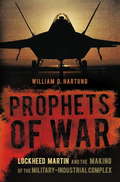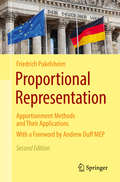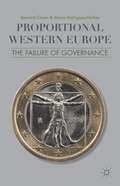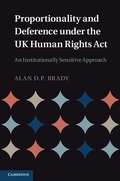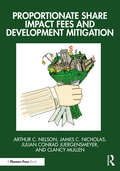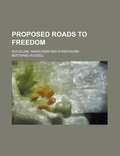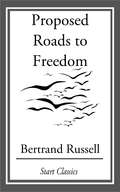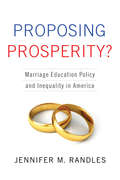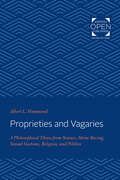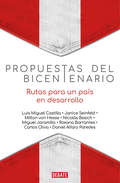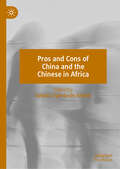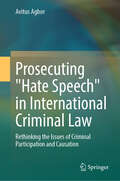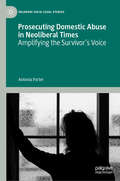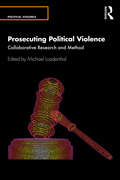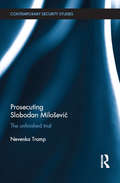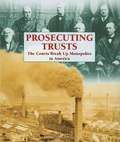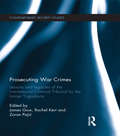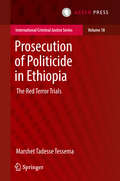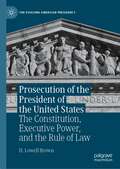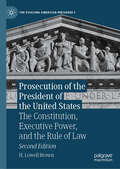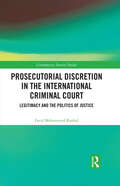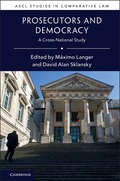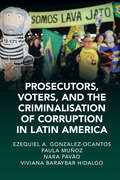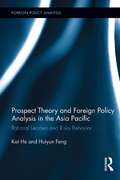- Table View
- List View
Prophets of War: Lockheed Martin and the Making of the Military-Industrial Complex
by William D. HartungEnthralling and explosive,Prophets of Waris an exposé of America’s largest military contractor, Lockheed Martin. When President Dwight D. Eisenhower gave his famous warning about the dangers of the military industrial complex, he never would have dreamed that a company could accumulate the kind of power and influence now wielded by this behemoth company. As a full-service weapons maker, Lockheed Martin receives over $25 billion per year in Pentagon contracts. From aircraft and munitions, to the abysmal Star Wars missile defense program, to the spy satellites that the NSA has used to monitor Americans’ phone calls without their knowledge, Lockheed Martin’s reaches into all areas of US defense and American life. William Hartung’s meticulously researched history follows the company’s meteoric growth and explains how this arms industry giant has shaped US foreign policy for decades.
Proportional Representation
by Friedrich PukelsheimThe book offers a rigorous description of the procedures that proportional representation systems use to translate vote counts into seat numbers. Since the methodological analysis is guided by practical needs, plenty of empirical instances are provided and reviewed to motivate the development, and to illustrate the results. Concrete examples, like the 2009 elections to the European Parliament in each of the 27 Member States and the 2013 election to the German Bundestag, are analyzed in full detail. The level of mathematical exposition, as well as the relation to political sciences and constitutional jurisprudence makes this book suitable for special graduate courses and seminars.
Proportional Western Europe
by Bernard Owen Maria Rodriguez-MckeyThis is a history of political parties in ten nations (with the sections on France and Germany limited to specific period), and a critique of the existing literature that emphasizes the importance of electoral rules as determinative of political party systems.
Proportionality and Deference under the UK Human Rights Act
by Alan D. BradyThe courts use the proportionality test to assess the Convention-compatibility of the full range of government action, from administrative decisions to primary legislation. In applying the test, the courts are often conscious of the need to pay some deference to the expertise and competence of other branches of government. This rigorous analysis of the relationship between proportionality and deference under the Human Rights Act sets out a model of proportionality, drawn from existing case law, which integrates deference within the multi-stage proportionality test. The model is 'institutionally sensitive' and can be applied to proportionality-based judicial review of all forms of government activity. The model is shown in operation in three fields that span the full range of government activity: immigration (administrative action), criminal justice (legislation) and housing (multi-level decisions).
Proportionality and the Rule of Law
by Grant Huscroft Grant Huscroft Bradley W. Miller Grégoire Webber Bradley W. MillerTo speak of human rights in the twenty-first century is to speak of proportionality. Proportionality has been received into the constitutional doctrine of courts in continental Europe, the United Kingdom, Canada, New Zealand, Israel, South Africa, and the United States, as well as the jurisprudence of treaty-based legal systems such as the European Convention on Human Rights. Proportionality provides a common analytical framework for resolving the great moral and political questions confronting political communities. But behind the singular appeal to proportionality lurks a range of different understandings. This volume brings together many of the world's leading constitutional theorists - proponents and critics of proportionality - to debate the merits of proportionality, the nature of rights, the practice of judicial review, and moral and legal reasoning. Their essays provide important new perspectives on this leading doctrine in human rights law.
Proportionate Share Impact Fees and Development Mitigation
by Arthur C. Nelson James C. Nicholas Julian Conrad Juergensmeyer Clancy MullenAfter decades of evolving practice often tested in court, development impact fees have become institutionalized in the American planning and local government finance systems. But, they remain contentious, especially as they continue to evolve. This book is the third in a series of impact fee guidebooks for practitioners, following A Practitioner’s Guide to Development Impact Fees and Impact Fees: Proportionate Share Development Fees. Proportionate Share Impact Fees and Development Mitigation is the culmination of the authors’ careers devoted to pioneering applications of the dual rational nexus test. That test requires (1) establishing the rational nexus between the need for infrastructure, broadly defined, to mitigate the impacts of development and (2) ensuring that development mitigating its infrastructure impacts benefits proportionately. The book elevates professional practice in two ways. First, it shows how the rational nexus test can be applied to all forms of development infrastructure impact mitigation. Second, it establishes the link between professional ethics and equity as applied to proportionate share impact fees and development mitigation. The book is divided into four parts, with the first reviewing policy and legal foundations, the second detailing the planning, calculation, and implementation requirements, the third exploring economic, ethical, and equity implications, and the fourth presenting state-of-the-art case studies. Proportionate Share Impact Fees and Development Mitigation sets new standards for professional practice.
Proposed Roads to Freedom
by Bertrand RussellThis historic book may have numerous typos and missing text. Purchasers can usually download a free scanned copy of the original book (without typos) from the publisher. Not indexed. Not illustrated. 1919 edition. Excerpt: . . . would labor if he were not compelled to do so by sheer necessity, we heard enough of it before the emancipation of slaves in America, as well as before the emancipation of serfs in Russia; and we have had the opportunity of appreciating it at its just value. So we shall not try to convince those who can be convinced only by accomplished facts. As to those who reason, they ought to know that, if it really was so with some parts of humanity at its lowest stages--and yet, what do we know about it?--or if it is so with some small communities, or separate individuals, brought to sheer despair by ill-success in their struggle against unfavorable conditions, it is not so with the bulk of the civilized nations. With us, work is a habit, and idleness an artificial growth. " Kropotkin, "Anarchist Communism," p. 30. "While holding this synthetic view on production, the Anarchists cannot consider, like the Collectivists, that a remuneration which would be proportionate to the hours of labor spent by each person in the production of riches may be an ideal, or even an approach to an ideal, society. " Kropotkin, "Anarchist Communism," p. 20. Among the more immediate measures advocated in the "Communist Manifesto" is "equal liability of all to labor. Establishment of industrial armies, especially for agriculture. " The Socialist theory is that, in general, work alone gives the right to the enjoyment of the produce of work. To this theory there will, of course, be exceptions: the old and the very young, the infirm and those whose work is temporarily not required through no fault of their own. But the fundamental conception of Socialism, in regard to our present question, is that all who can should be compelled to work, either by the threat of starvation or. . .
Proposed Roads to Freedom
by Bertrand RussellBertrand Russell's critical accounts of Socialism, Anarchism, and Syndicalism are well worth careful reading. He knows his subject and sees with clear vision the defects in these "Proposed Roads to Freedom."
Proposing Prosperity?: Marriage Education Policy and Inequality in America
by Jennifer Randles"Fragile families"—unmarried parents who struggle emotionally and financially—are one of the primary targets of the Healthy Marriage Initiative, a federal policy that has funded marriage education programs in nearly every state. These programs, which encourage marriage by teaching relationship skills, are predicated on the hope that married couples can provide a more emotionally and financially stable home for their children. Healthy marriage policy promotes a pro-marriage culture in which two-parent married families are considered the healthiest. It also assumes that marriage can be a socioeconomic survival mechanism for low-income families, and an engine of upward mobility. Through interviews with couples and her own observations and participation in marriage education courses, Jennifer M. Randles challenges these assumptions and critically examines the effects of such classes on participants. She takes the reader inside healthy marriage classrooms to reveal how their curricula are reflections of broader issues of culture, gender, governance, and social inequality. In analyzing the implementation of healthy marriage policy, Randles questions whether it should target individual behavior or the social and economic context of that behavior. The most valuable approach, she concludes, will not be grounded in notions of middle-class marriage culture. Instead, it will reflect the fundamental premise that love and commitment thrive most within the context of social and economic opportunity.
Proprieties and Vagaries: A Philosophical Thesis from Science, Horse Racing, Sexual Customs, Religion, and Politics
by Albert L HammondOriginally published in 1961. A constant influence on human action is that of proprieties, personal and social. These attitudes and traditions defining what is proper are largely logical in origin, but chance has a way of upsetting them. Even theory, which is part of human action, is subject to this influence. Dr. Hammond takes a novel approach to this philosophical theme. His topics of discussion include perception, the role of symbols in poetry and science, the definition of good and good use in language, space and the motion of the earth, the psychology of love, attitudes toward gambling, and a defense of horse racing. This unorthodox approach results in an exceptionally imaginative and thought-provoking book as well as a strong defense of deontology.
Propuestas del bicentenario: Rutas para un país en desarrollo
by Videnza ConsultoresEn un año decisivo en que conmemora el Bicentenario de la Independencia y se estrena un nuevo gobierno en el Perú, la aparición de este libro resulta de suma importancia para vaanzar hacia el desarrollo que demanda con urgencia el país. Propuestas del Bicentenario propone un conjunto de reformas orien Stadas a fortalecer la institucionalidad y alcanzar el bienestar de todos los ciudadanos. Diseñadas por un equipo de especialistas, bajo la conducción de Videnza Consultores, las propuestas comprenden ocho ejes: reactivación económica; empleo, formalización y protección social; gestión sostenible de los recursos naturales; gestión sostenible de los recursos naturales; gestión pública para mejores servicios; salud desde la prevención y los cuidados médicos cercanos; educación para la empleabilidad; agua y saneamiento de calidad; y reforma fiscal para la estabilidad macroeconómica. Con la convicción de que es posible aplicar políticas eficientes y sostenidas en las agendas de Estado, este libro busca contribuir a sentar las bases de una sociedad más justa, próspera, cohesionada y moderna. Los autores de esta publicación son Luis Miguel Castilla, Janice Seinfeld, Milton von Hesse; Nicolás Besich, Miguel Jaramillo, Roxana Barrantes, Carlos Oliva y Daniel Alfaro
Pros and Cons of China and the Chinese in Africa
by Sabella Ogbobode AbiddeThis volume offers a critical evaluation of China&’s programs and projects on the African continent, zooming in on: (a) whether China is preying on states and societies on the continent or, if indeed, she is a benevolent partner on the continent; (b) whether many of the projects are undeniably integral to the growth and development of the continent, or are mostly white elephant projects; (c) examine the cost-benefit of China&’s involvement on the continent economic and political space; and (d) why Euro-America countries complain about the role and place of China in Africa? Bringing together mostly African scholars, the research underlines the key pros and cons of China and the Chinese involvement in the continent.
Prosecuting "Hate Speech" in International Criminal Law: Rethinking the Issues of Criminal Participation and Causation
by Avitus AgborThe book explores the prohibition and prosecution of hate speech in international law. Building on the international legal framework, the invaluable jurisprudence of the Trial and Appeal Chambers of the UN ad hoc Tribunals (the ICTY and the ICTR), and views of scholars in the social sciences, the book focuses on two inter-related complexities in prosecuting hate speech in international criminal law: criminal participation and causation. A hypothetical scenario is developed, with numerous actors playing various roles in that given context, with the impact of altering their criminal liability, and raising further questions that touch on the issue of causation in criminal law.
Prosecuting Domestic Abuse in Neoliberal Times: Amplifying the Survivor's Voice (Palgrave Socio-Legal Studies)
by Antonia PorterThis book argues that past inattentive treatment by state criminal justice agencies in relation to domestic abuse is now being self-consciously reversed by neoliberal governing agendas intent on denouncing crime and holding offenders to account. Criminal prosecutions are key to the UK government’s strategy to end Violence Against Women and Girls. Crown Prosecution Service policy affirms that domestic abuse offences are ‘particularly serious’ and prosecutors are reminded that it will be rare that the ‘public interest’ will not require of such offences through the criminal courts. Seeking to unpick some of the discourses and perspectives that may have contributed to the current prosecutorial commitment, the book considers its emergence within the context of the women’s movement, feminist scholarship and an era of neoliberalism. Three empirical chapters explore the prosecution commitment on the one hand, and the impact on women’s lives on the other. The book’s final substantive chapter offers a distinctive normative conceptual framework through which practitioners may think about women who have experienced domestic abuse that will have both intellectual appeal and practical application.
Prosecuting Political Violence: Collaborative Research and Method (Political Violence)
by Michael LoadenthalThis volume unpacks the multidimensional realities of political violence, and how these crimes are dealt with throughout the US judicial system, using a mixed methods approach. The work seeks to challenge the often-noted problems with mainstream terrorism research, namely an overreliance on secondary sources, a scarcity of data-driven analyses, and a tendency for authors not to work collaboratively. This volume inverts these challenges, situating itself within primary-source materials, empirically studied through collaborative, inter-generational (statistical) analysis. Through a focused exploration of how these crimes are influenced by gender, ethnicity, ideology, tactical choice, geography, and citizenship, the chapters offered here represent scholarship from a pool of more than sixty authors. Utilizing a variety of quantitative and qualitative methods, including regression and other forms of statistical analysis, Grounded Theory, Qualitative Comparative Analysis, Corpus Linguistics, and Discourse Analysis, the researchers in this book explore not only the subject of political violence and the law but also the craft of research. In bringing together these emerging voices, this volume seeks to challenge expertism, while privileging the empirical. This book will be of much interest to students of terrorism and political violence, criminology, and US politics.
Prosecuting Slobodan Milošević: The Unfinished Trial (Contemporary Security Studies)
by Nevenka TrompThis book offers a comprehensive analysis of the trial of former Serbian leader Slobodan Milošević at the International Criminal Tribunal for the former Yugoslavia (ICTY). With the premature death of Milošević in March 2006 his trial was left unfinished. Although the traditional objectives of criminal law, such as retribution, justice for victims, and deterrence, were not achieved, the Milošević trial archive is a significant historical resource for researchers from various fields. This book extracts details from the collection of documentary and transcript evidence that makes up the trial record – sources which would be almost impossible to extricate without an insider’s guiding hand – to allow readers to trace the threads of several historical narratives. The value of this methodology is particularly evident in the Milošević case as, acting as his own defence counsel, he responded to, and interacted with, almost all witnesses and evidence presented against him. By providing snapshots of the behaviour displayed by Milošević in court while conducting his defence, in combination with passages of carefully selected evidence from an immense archive familiar to few scholars, this volume reveals how these trial records, and trail records in general, are a truly invaluable historical source. The book underlines the premise that any record of a mass atrocities trial, whether finished or unfinished, establishes a record of past events, contributes to interpretations of a historical period and influences the shaping of collective memory. This book will be of much interest to students of the Former Yugoslavia, war crimes, international law, human rights, international relations and European politics.
Prosecuting Trusts: The Courts Break Up Monopolies In America (Primary Sources Of The Progressive Movement Series)
by Bernadette BrexelBig business in the mid-1800s worked to eliminate competition by purchasing smaller businesses or undercutting their prices. They created trusts, or groups of businesses under one giant merging corporation, affecting both small businesses and farmers. As this book effectively addresses, there were calls for business reform by the 1890s. Laws like the Sherman Antitrust Act sought to redress the problems of big business, but it was through the efforts of President Theodore Roosevelt that the federal government went after these trusts; those actions earned Roosevelt the reputation as a trust buster.
Prosecuting War Crimes: Lessons and legacies of the International Criminal Tribunal for the former Yugoslavia (Contemporary Security Studies)
by Rachel Kerr James Gow Zoran PajićThis volume examines the legacy of the International Criminal Tribunal for the former Yugoslavia (ICTY), which was created under Chapter VII of the UN Charter as a mechanism explicitly aimed at the restoration and maintenance of international peace and security. As the ICTY has now entered its twentieth year, this volume reflects on the record and practices of the Tribunal. Since it was established, it has had enormous impact on the procedural, jurisprudential and institutional development of international criminal law, as well as the international criminal justice project. This will be its international legacy, but its legacy in the region where the crimes under its jurisdiction took place is less clear; research has shown that reactions to the ICTY have been mixed among the communities most affected by its work. Bringing together a range of key thinkers in the field, Prosecuting War Crimes explores these findings and discusses why many feel that the ICTY has failed to fully engage with people’s experiences and meet their expectations. This book will be of much interest to students of war crimes, international criminal law, Central and East European politics, human rights, and peace and conflict studies.
Prosecution of Politicide in Ethiopia: The Red Terror Trials (International Criminal Justice Series #18)
by Marshet Tadesse TessemaThis book investigates the road map or the transitional justice mechanisms that theEthiopian government chose to confront the gross human rights violations perpetratedunder the 17 years’ rule of the Derg, the dictatorial regime that controlled state powerfrom 1974 to 1991. Furthermore, the author extensively examines the prosecution ofpoliticide or genocide against political groups in Ethiopia.Dealing with the violent conflict, massacres, repressions and other mass atrocities ofthe past is necessary, not for its own sake, but to clear the way for a new beginning.In other words, ignoring gross human rights violations and attempting to close thechapter on an oppressive dictatorial past by choosing to let bygones be bygones, is nolonger a viable option when starting on the road to a democratic future. For unaddressedatrocities and a sense of injustice would not only continue to haunt a nation butcould also ignite similar conflicts in the future.So the question is what choices are available to the newly installed government whenconfronting the evils of the past. There are a wide array of transitional mechanismsto choose from, but there is no “one size fits all” mechanism. Of all the transitionaljustice mechanisms, namely truth commissions, lustration, amnesty, prosecution,and reparation, the Ethiopian government chose prosecution as the main means fordealing with the horrendous crimes committed by the Derg regime.One of the formidable challenges for transitioning states in dealing with the crimes offormer regimes is an inadequate legal framework by which to criminalize and punishegregious human rights violations. With the aim of examining whether or not Ethiopiahas confronted this challenge, the book assesses Ethiopia’s legal framework regardingboth crimes under international law and individual criminal responsibility.This book will be of great relevance to academics and practitioners in the areas ofgenocide studies, international criminal law and transitional justice. Students in thefields of international criminal law, transitional justice and human rights will alsofind relevant information on the national prosecution of politicide in particular andthe question of confronting the past in general.Marshet Tadesse Tessema is Assistant Professor of the Law School, College of Law andGovernance at Jimma University in Ethiopia, and Postdoctoral Fellow of the SouthAfrican-German Centre, University of the Western Cape in South Africa.
Prosecution of the President of the United States: The Constitution, Executive Power, and the Rule of Law (The Evolving American Presidency)
by H. Lowell BrownThis book provides a detailed look at the constitutional, historical, and political arguments concerning presidential immunity from prosecution, as well as the opinions of the Office of Legal Counsel that provided the justification for the decision not to prosecute President Trump. Focusing on those opinions, the book examines the constitutional basis of presidential immunity, both textual and historical, as reflected in the deliberations of the 1787 Convention and the ratification debates. The opinions are viewed in the context of the criminal investigations of Presidents Nixon and Clinton that gave rise to those opinions, as well as the pronouncements of the Supreme Court concerning their claims, and those of President Trump to immunity from judicial inquiry. Lastly, the book analyzes presidential immunity in light of the separation of powers, the availability of impeachment, and the discordance between presidential immunity and the rule of law.
Prosecution of the President of the United States: The Constitution, Executive Power, and the Rule of Law (The Evolving American Presidency)
by H. Lowell BrownThis book provides a detailed look at the constitutional, historical, and political arguments concerning presidential immunity from prosecution, as well as the opinions of the Office of Legal Counsel that provided the justification for the decision not to prosecute President Trump. Focusing on those opinions, the book examines the constitutional basis of presidential immunity, both textual and historical, as reflected in the deliberations of the 1787 Convention and the ratification debates. The opinions are viewed in the context of the criminal investigations of Presidents Nixon and Clinton that gave rise to those opinions, as well as the pronouncements of the Supreme Court concerning their claims, and those of President Trump to immunity from judicial inquiry. Lastly, the book analyzes presidential immunity in light of the separation of powers, the availability of impeachment, and the discordance between presidential immunity and the rule of law. This new edition includes audiobook files at the chapter level.
Prosecutorial Discretion in the International Criminal Court: Legitimacy and the Politics of Justice (Contemporary Security Studies)
by Farid Mohammed RashidThis book provides the first scholarly investigation of prosecutorial discretion in the International Criminal Court (ICC) from an interdisciplinary perspective. This work analyses the discretionary power of the ICC prosecutor and its scope. It explains that there is a tendency to overlook the necessity of distinguishing between the various usages of discretion when exercised as a power authorised by the law and effect when applying indeterminate legal thresholds. The author argues that the latter indeterminacy may give decision makers an unwarranted opportunity to exercise a wide range of discretion, where extra-legal factors may be considered. In comparison, prosecutorial discretion allows decision makers to consider extra-legal considerations. This book also discusses the relevance of political considerations within the decision-making process in the context of the exercise of prosecutorial discretion. It suggests that there need not be a conflict between the broad sense of justice as outlined in the Statute and political factors in giving effect to decisions. This book will be of interest to students of international law, global governance and international relations.
Prosecutors and Democracy: A Cross-National Study (ASCL Studies in Comparative Law)
by Máximo Langer Sklansky David AlanFocusing squarely on the relationship between prosecutors and democracy, this volume throws light on key questions about prosecutors and what role they should play in a democracy. Internationally distinguished scholars discuss how prosecutors can strengthen democracy, how they can undermine it, and why it has proven so challenging to hold prosecutors accountable while insulating them from politics. Drawing on experiences from the United States, the UK and continental Europe, the contributors show how different legal systems have addressed that challenge in very different ways. Comparing and contrasting those strategies allows us to assess their relative strengths - and to gain a richer understanding of the contested connections between law and democratic politics. Chapters are in explicit conversation with each other, showing how each author's perspective informs, or differs from, that of the others. This is an ideal resource for legal scholars and reformers, political philosophers, and social scientists.
Prosecutors, Voters and the Criminalization of Corruption in Latin America: The Case of Lava Jato (Cambridge Studies in Law and Society)
by Paula Muñoz Ezequiel A. Gonzalez-Ocantos Nara Pavão Viviana Baraybar HidalgoLava Jato, a transnational bribery case that started in Brazil and spread throughout Latin America, upended elections and collapsed governments. Why did the investigation gain momentum in some countries but not others? The book traces reforms that enhanced prosecutors' capacity to combat white-collar crime and shows that Lava Jato became a full-blown anti-corruption crusade where reforms were coupled with the creation of aggressive taskforces. For some, prosecutors' unconventional methods were necessary and justified. Others saw dangerous affronts to due process and democracy. Given these controversies, how did voters react to a once-in-a-generation attempt to clean politics? Can prosecutors trigger hope, conveying a message of possible regeneration? Or does aggressive prosecution erode the tacit consensus around the merits of anti-corruption? Prosecutors, Voters and The Criminalization of Corruption in Latin America is a study of the impact of accountability through criminalization, one that dissects the drivers and dilemmas of resolute transparency efforts.
Prospect Theory and Foreign Policy Analysis in the Asia Pacific: Rational Leaders and Risky Behavior (Foreign Policy Analysis)
by Kai He Huiyun FengWhy does North Korea behave erratically in pursuing its nuclear weapons program? Why did the United States prefer bilateral alliances to multilateral ones in Asia after World War II? Why did China become "nice"—no more military coercion—in dealing with the pro-independence Taiwan President Chen Shuibian after 2000? Why did China compromise in the negotiation of the Chunxiao gas exploration in 2008 while Japan became provocative later in the Sino-Japanese disputes in the East China Sea? North Korea’s nuclear behavior, U.S. alliance strategy, China’s Taiwan policy, and Sino-Japanese territorial disputes are all important examples of seemingly irrational foreign policy decisions that have determined regional stability and Asian security. By examining major events in Asian security, this book investigates why and how leaders make risky and seemingly irrational decisions in international politics. The authors take the innovative step of integrating the neoclassical realist framework in political science and prospect theory in psychology. Their analysis suggests that political leaders are more likely to take risky actions when their vital interests and political legitimacy are seriously threatened. For each case, the authors first discuss the weaknesses of some of the prevailing arguments, mainly from rationalist and constructivist theorizing, and then offer an alternative explanation based on their political legitimacy-prospect theory model. This pioneering book tests and expands prospect theory to the study of Asian security and challenges traditional, expected-utility-based, rationalist theories of foreign policy behavior.
